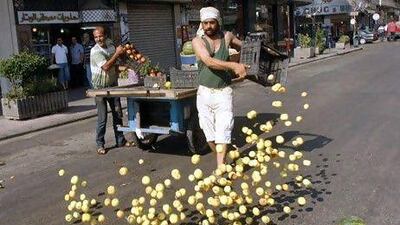There are now four convenience stores on my small street in Beirut. For the past 11 years there were two, one on opposite corners of one end and run by elderly men who had an unspoken agreement: "You have your customers and I have mine".
Raymond had the best "pitch", being closer to the Hotel Albergo. His shop was the obvious destination for hotel staff on their break and the taxi drivers who "worked" the entrance. The other man - I know him only as Mr Moor - catches pedestrians heading west on Rue Abdel Wahab El Inglizi and has the added advantage of selling newspapers and magazines. It was, on the surface at least, a convivial arrangement.
But last year, a frisson of mild excitement rippled down Rue Albert Naccache. What was once a computer store was taken over by a young man called Mohammed and turned into a grocery. Mohammed's shelves were more ordered and his shop better lit. He also sold a modest but fresh, and well presented, selection of fruits and vegetables. It did not take much for my housekeeper to decide where she was going to shop, and soon receipts bearing the legend "Mini Market Mo" began appearing under fridge magnets.
Raymond maintained a quiet dignity in the face of this challenge, but even Mo could not claim to have wholly conquered the street. Only two weeks ago, another store, almost identical in layout, design and stock to Mini Market Mo appeared not four doors down. The retail Darwinism has begun.
Then again, in Lebanon, everyone copies everyone else. After the people of the south made the world's biggest plates of hummus, tabbouleh and kibbeh, wine producers in Lebanon went on to fill the world's biggest wine glass, while Christians erected the world's biggest lit crucifix. On Sunday, the northern coastal city of Batroun jumped on the record-breaking bandwagon and made the world's biggest glass of lemonade.
Batroun is apparently famed for its lemonade, and the event afforded Gebran Bassil, an MP and the energy minister, respite from being flayed for his handling of the electricity crisis. It was also an opportunity to remind everyone that making giant glasses of fruit juice was better for Lebanon's image than blocking roads at the slightest hint of a grievance. But I fear that Mr Bassil may have urged us to shut the stable door after the proverbial horse has bolted. Road blocking has, it appears, gripped the nation. What started as a means of protesting at the disgraceful shortage of electricity has morphed into a form of national expression.
In the past seven days alone, the families of the 11 Shia pilgrims kidnapped in Aleppo in May staged a huge sit-in on the airport road, while aggrieved vegetable sellers in Sidon did the same, to protest against being moved to a new market location. In Beirut on Tuesday, women staged a mass "die-in" in front of parliament to protest against lax laws on domestic violence; while the residents of Zalka and Jal El Dib were so forceful when they took to the streets to protest against the demolition of a bridge that left many areas of the two northern suburbs virtually inaccessible, the government has approved the building of a tunnel and overpass.
And if spontaneous expressions of anger cannot set every pulse racing, the kidnapping and armed-robbery sectors are also enjoying something of a revival. Five banks have been robbed in recent weeks with various degrees of success.
Abductions are also on the rise. The son of the popular TV herbalist Zein Al Atat was snatched by masked men in SUVs in the mountain resort of Sawfar. He was released last week, his family denying a ransom had been paid.
"Nonsense," said a local journalist who knows how these things work. "The kidnappers will ask for US$1 million [Dh3.6m]. The family tells them to go to hell and offers $30,000. They figure 'what the heck, it's not bad money for a day's work'."
I wonder what's next.
Michael Karam is the associate editor in chief of Executive, a regional business magazine based in Lebanon
twitter: Follow and share our breaking business news. Follow us
iPad users can read the digital edition of business section as it was printed via our e-reader app. Click here

